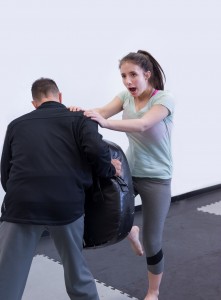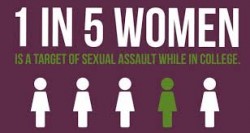The school year is winding down, and recent high school graduates will be turning their attention to preparing for college in the fall. College is an exciting, brand new adventure for incoming freshmen. What will your classes be like? Will you get along with your roommate? What will you major in? It is also an exciting, and scary, time for parents. Will my child do well? Will they be able to manage the increased independence? And for the parents of young women – will they be safe from possible sexual assault? How can I help them be prepared to protect themselves?
1 in 5 College Women Will Experience Sexual Assault
In recent years, there has been greater attention on the prevalence of sexual assault at our nation’s colleges and universities. Multiple studies and reports state that at least 1 in 5 college women will experience some form of sexual assault while at school (Journal of American College Health, 2009, Washington Post – Kaiser Family Foundation, 2015, & White House Task Force to Protect Students from Sexual Assault, 2014). Sexual assault can include a wide range of forced, unwanted, or coerced sexual contact or behavior including kissing, groping, and rape. Universities have faced criticism for not taking victims’ complaints seriously, and imposing few, if any consequences on perpetrators – even allowing perpetrators to remain on campus where they may assault again. Universities have also been accused of under reporting rates of sexual assault to protect the reputations of their schools, and not doing enough to protect the safety of their students. It’s frightening to think of sending our daughters off to this kind of environment unprepared.
Women Who Receive Self-Defense Training Are Less Likely to Be Victims of Sexual Assault
At National Karate we will start getting calls in the summer from parents who want to help their daughters reduce their chances of being assaulted. We will offer classes dedicated to teaching self-defense skills and focusing on ways to increase safety specifically in the college setting. We will also visit high school seniors in several local high schools in the spring to discuss prevention, safety tips, and strategies. Seniors who attend these classes can also take advantage of an offer for a free month of marital arts classes to help them practice and learn additional skills before they go off to college.
Experts agree that self-defense training is a valuable tool in sexual assault prevention, and studies have shown that women who have received training are less likely to be victims of assault. Effective women’s self-defense training can increase assertiveness, perceived control, self-efficacy, risk avoidance behaviors, confidence, and self-esteem (Hollander, 204). Learning self-defense has also been demonstrated to help women feel stronger, and less anxious and fearful (Brecklin, 2008). All of this helps to make women less vulnerable to assault.
75% of Sexual Assaults are Committed by Someone the Victim Knows
National Karate’s self-defense classes teach skills that help to prevent an assault from occurring, as well as ways to respond if an attack does occur. At least seventy-five percent of sexual assaults are committed by someone the victim already knows. This means for women at college, it’s not always a stranger coming out of the darkness that is the greatest concern, it can also be the guy they meet in class, in their dorm (many colleges have co-ed dorms where men and women share the same floor), or at a party. To effectively defend themselves, women have to be armed with confidence, and a cautious awareness of their surroundings and the behavior of other people. We teach women to trust their instincts if they feel uncomfortable, and leave situations when they feel threatened. We also provide training on ways to use body language and verbal skills in relationships to convey assertiveness, and establish boundaries which helps to minimize attempted assaults. We also discuss warning signs that a relationship may become abusive, and lead to physical or sexual violence.
Walking Alone on Campus is Also a Risk

The Undetected Rapist

Predatory Culture Focused on “Conquests”

National Karate’s Self-Defense Training Helps Educate Young Women About All the Dangers

At National Karate we have girls and women who have been training with us for years. They have learned physical skills necessary to protect themselves. They have also gained confidence and a greater sense of personal efficacy that will help them reduce their risk of even being targeted for an assault. I have watched these young women go off to school, and I truly feel they are better prepared. Ultimately, we need to find ways to change the attitudes and behaviors that devalue and objectify women, and lead to a culture where violence against women exists. In the meantime, self-defense training can empower young women with strategies and skills that will help them protect themselves.
If you know of a young High School or College age woman, please share this article with them and please use the share buttons below to share on social media.
This article is written by Ms. Juli Brown. Ms. Brown is a National Karate Instructor and is also a Certified Women’s Self-Defense Instructor by the National Women’s Martial Arts Federation. Click here to learn more about Ms Brown.







